As Trump demands a ceasefire timeline and threatens Russian tariffs, Moscow delays while stepping up underground tactics on the battlefield and seeking sanctions relief
Summary of the Day – March 31, 2025
The last day of March revealed a complex diplomatic dance as U.S. President Donald Trump declared a “psychological deadline” for Russian President Vladimir Putin to agree to a ceasefire in Ukraine—without specifying what happens when that deadline arrives. Meanwhile, Moscow continued its pattern of delay tactics, demanding Western sanctions relief before implementing even partial ceasefires in the Black Sea. On the battlefield, Russian forces attempted a novel approach in Toretsk, trying to bypass Ukrainian positions through underground tunnels and communications. Sweden stepped forward with its largest military aid package yet—nearly $1.6 billion—as European allies seek to bolster Ukraine amid uncertainty about future U.S. support. In a surprising development, Trump’s spiritual adviser, Pastor Mark Burns, visited Bucha and other liberated Ukrainian towns, witnessing firsthand the aftermath of Russian atrocities and meeting with religious leaders.
Trump’s Psychological Warfare: U.S. President Sets Ambiguous Deadline for Putin
U.S. President Donald Trump ratcheted up pressure on Moscow, declaring on March 30 that there is a “psychological deadline” for Russian President Vladimir Putin to agree to a ceasefire in Ukraine. The statement came without a specific date attached, leaving observers to speculate about what consequences might follow.
“If I think they’re tapping us along, I will not be happy about it,” Trump told reporters aboard Air Force One, revealing frustration with Moscow’s reluctance to commit to a full truce. The president vacillated between threats and reassurances, softening his rhetoric about Putin after telling NBC News earlier the same day that he was “pissed off” with the Russian leader over his fixation on Ukrainian President Volodymyr Zelensky’s legitimacy.
When asked whether the relationship had reached its “lowest point,” Trump backpedaled: “No, I don’t think so. I don’t think he’s going to go back on his word… We’ve always gotten along well.”
Finnish President Alexander Stubb, who visited Trump over the weekend at his Mar-a-Lago residence, proposed April 20 as a “good time” for an unconditional ceasefire, potentially suggesting a more concrete timeline than Trump’s ambiguous psychological deadline.
The diplomatic pressure comes as Putin has rejected a full 30-day truce agreed upon by the U.S. and Ukraine in Jeddah on March 11, instead offering only partial ceasefires on energy infrastructure and in the Black Sea—both with strings attached that undermine Ukrainian defense capabilities.
Moscow’s Open Door Policy: Kremlin Claims Willingness to Talk Despite Trump’s Anger
Despite reports of Trump’s rising frustration with Putin, Kremlin spokesperson Dmitry Peskov insisted on March 31 that Russia remains willing to engage with the United States in peace negotiations.
“We are working on implementing some ideas related to the Ukrainian settlement. This work is underway. So far, there are no specifics that we could and should have informed you about,” Peskov said, downplaying reports of tension between the two leaders.
Peskov’s statement came in response to NBC News reporting that Trump was “pissed off” over Putin’s latest demand for a transitional government in Ukraine to replace Zelensky—a demand that Trump acknowledged suggested peace talks were “not going in the right location.”
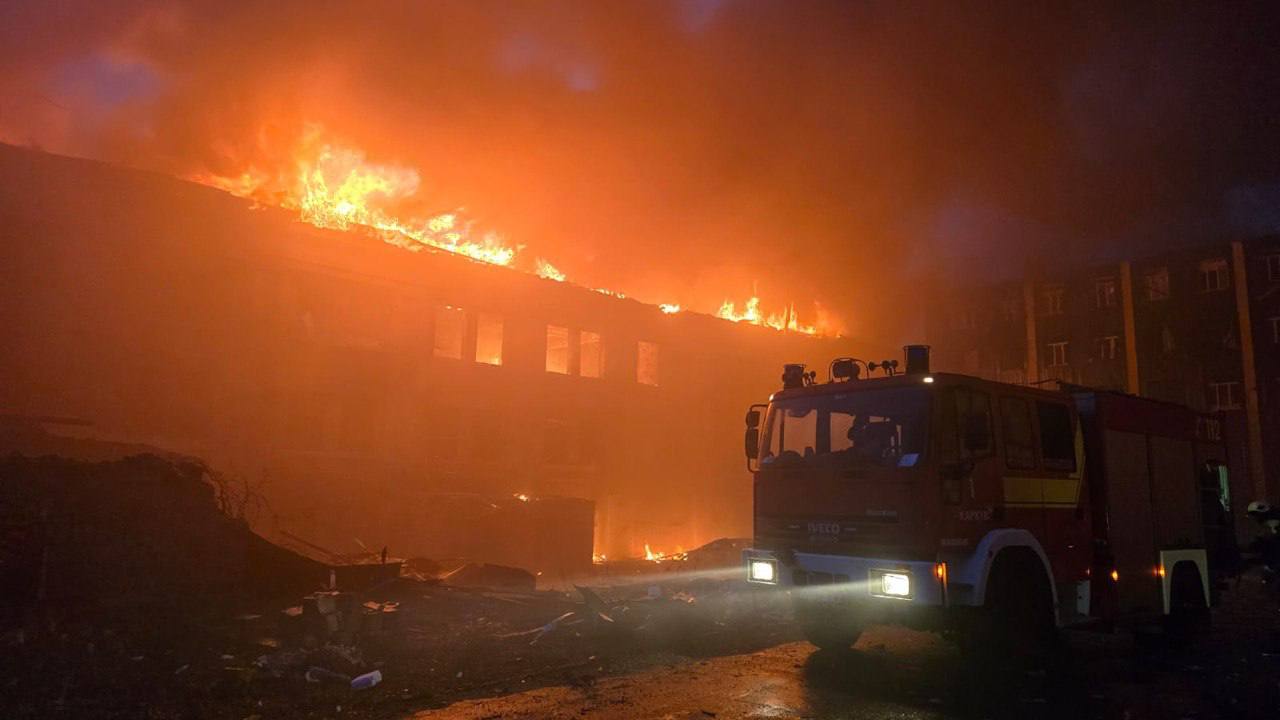
The aftermath of a Russian attack on Kharkiv Oblast. (Oleh Syniehubov/Telegram)
The Kremlin spokesperson dismissed these reports, claiming Trump’s comments were paraphrased rather than direct quotes, and reiterated that Putin remains open to dialogue with Washington despite the obvious tensions.
While the U.S. has mediated a partial ceasefire covering energy infrastructure strikes, Ukraine has already accused Russia of violating the agreement, pointing to attacks on energy facilities in Kherson on March 27, despite Moscow’s claims that it had adhered to a moratorium on such strikes since March 18.
The Minerals Standoff: U.S.-Ukraine Talks Continue Amid Escalating Rhetoric
Ukrainian and U.S. government and legal teams continue discussions on a controversial minerals deal, a source in the Presidential Office told the Kyiv Independent on March 31, even as Trump escalates his rhetoric about the agreement.
“On Friday (March 28), we spoke with the American side; now we (Ukraine) will discuss it, then (the parties) will talk again,” the source said, responding to Trump’s claim that he believed Zelensky wanted to back out of the agreement.
Speaking to reporters aboard Air Force One, Trump warned that Zelensky’s refusal would have “big, big problems” and followed his comments by asserting: “He wants to be a member of NATO, but he’s never going to be a member of NATO. He understands that.”
According to the Kyiv Independent’s source, Ukraine’s NATO membership is not part of the minerals deal. “We are not tying (the minerals deal to NATO), it’s a misunderstanding,” they said.
The Financial Times reported on March 27 that the latest version of the agreement proposed by the U.S. includes terms that would grant Washington unprecedented control over Ukraine’s natural resources through a joint investment fund.
Ukrainian media outlet European Pravda wrote that the deal may contradict Ukraine’s EU accession due to severe restrictions affecting Ukraine’s economic sovereignty.
Following the news, Zelensky said that Kyiv would not sign the deal if it threatened the country’s EU membership and reiterated that he does not consider Washington’s aid to Kyiv a debt.
Underground Warfare: Russian Forces Tunnel Beneath Toretsk
Russian soldiers attempted a novel approach to breaking Ukrainian defenses in Toretsk, Donetsk Oblast, trying to enter Ukraine’s rear via underground communications as battles in the city continue, said Victor Tregubov, a spokesperson for Ukraine’s Khortytsia group of forces, on March 31.
Toretsk, which lies roughly 20 kilometers (12 miles) southwest of Russian-occupied Bakhmut, has seen fierce fighting in recent months. Ukraine launched a counterattack in late February and early March, but the city remains largely occupied by Russian troops.
“Since this is also a priority sector, the Russians are trying to use every chance to bypass Ukrainian troops,” the spokesperson said on national television, explaining that Russian forces are having difficulty moving through the streets of Toretsk, forcing them to resort to underground passages.
This isn’t the first time Russian forces have employed such tactics. In a similar instance earlier this month, Russian troops allegedly used a gas pipeline to gain a foothold on the outskirts of Sudzha in Russia’s Kursk Oblast to conceal their movement.
The underground maneuver comes as Ukraine’s military reported that Russian forces have resumed their attacks in the Pokrovsk sector, which had experienced a relative lull in Russian activity until then.
Sweden’s $1.6 Billion Pledge: Stockholm Unveils Its Largest Military Aid Package
Sweden will provide Ukraine with a military aid package worth almost $1.6 billion, Swedish Defense Minister Pal Jonson announced on March 31, marking the country’s largest tranche of military assistance since the beginning of Russia’s full-scale invasion in 2022.
“The package includes, among other things, support for Ukraine’s air defense, artillery, satellite communications, and maritime capacity,” the minister said. With this package, Sweden’s support to Ukraine since 2022 amounts to 80 billion Swedish kronor ($8 billion).
The latest package includes $912 million worth of equipment that will be procured from the Swedish defense industry and delivered to Ukraine in the span of “about 0-24 months,” along with a $465 million donation to international multilateral initiatives, the Ukraine Defense Contact Group, and purchases from the Ukrainian defense industry.
Kyiv will further receive material and spare parts from the Swedish Armed Forces worth about $93 million, including m/58 machine guns, ammunition, roughly 100 vehicles of various types for air base maintenance, and other support.
Stockholm is also allocating $46 million for an export guarantee to supplement procurement for donations to Ukraine, ensuring more Swedish companies can support Kyiv by providing requested material.
The Swedish Defense Materiel Administration “will also be tasked with identifying, testing and funding military solutions from small tech companies that need to be verified or scaled up for military purposes in Ukraine,” Jonson added.
The package comes as European countries seek to bolster support for Ukraine as future backing from the U.S., the leading military donor, grows increasingly uncertain under President Donald Trump.
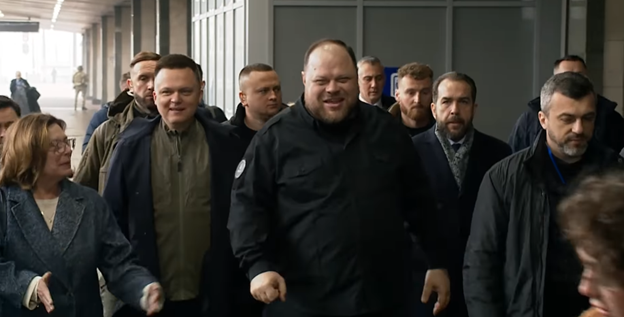
Verkhovna Rada Speaker Ruslan Stefanchuk (c) welcoming European parliamentary leaders in Kyiv, Ukraine, with Marshal of the Polish Sejm Szymon Holownia on his right and Polish charge d’affaires in Ukraine, Piotr Lukaszewicz, on his left. (Ruslan Stefanchuk/Facebook)
Pastor in the War Zone: Trump’s Spiritual Adviser Visits Bucha
U.S. President Donald Trump’s spiritual advisor, Pastor Mark Burns, arrived in Ukraine and visited cities in Kyiv Oblast that were liberated from Russian forces in 2022, Chief Rabbi of Ukraine Moshe Azman said on March 31.
Azman invited Burns to visit Bucha, Borodianka, and Irpin, towns where hundreds of residents were found to have been tortured, raped, and executed by the Russian army three years ago, after Moscow’s attempts to encircle Kyiv failed.
“The war in Ukraine is bigger than Democrats or Republicans, the left or the right. Whether you dislike President Trump or President Zelensky, real people are dying here,” Burns said on social media.
Reflecting on his trip to Kyiv Oblast, Burns listed Russian war crimes, including deported children, raped women, executions of civilians, and destruction of multiple churches. Ukraine’s top religious leaders also told him about Russia’s systematic religious persecution.
“Yet despite these horrors, Ukraine stands strong as a beacon of religious freedom, welcoming all faiths,” Burns said.
The pastor highlighted that Ukrainian soldiers on the front line “are not asking for money” but for more weapons and fighter jets “to shoot down the drones that still fire at civilian buildings, and killing people.”

U.S. Pastor Mark Burns arrived in Ukraine and visited cities in Kyiv Oblast liberated from Russian forces three years ago. (Chief Rabbi of Ukraine Moshe Azman/Facebook)
Mark Burns is a televangelist and pastor of Harvest Praise & Worship Center in South Carolina. He supported Donald Trump in the 2016 presidential election and was labeled by Time Magazine as “Donald Trump’s Top Pastor.”
“Pastor Burns is a man who has the ability to be heard where big decisions are made. And I believe that the voice of truth from Ukraine will be brought to the heart of the new U.S. leadership,” Azman said.
Battle for the Black Sea: Russia Links Ceasefire to Sanctions Relief
As diplomatic efforts continue to secure a ceasefire in Ukraine, Moscow has made implementation of a partial truce in the Black Sea conditional on Western sanctions relief, potentially compromising the integrity of the entire sanctions regime.
The Kremlin has insisted that the U.S. lift sanctions on Rosselkhozbank, Russia’s state-owned agricultural bank, and other unspecified financial organizations involved in international food and fertilizer trade. Bloomberg reported on March 28 that Russia is also demanding that the European Union reconnect Rosselkhozbank to the SWIFT international banking system.
Moscow has framed its request as a necessary step to boost its global food and fertilizer trade, but experts warn that lifting sanctions could directly benefit Russia’s war machine.
“Any easing of sanctions directly benefits the system fueling Russia’s war,” a Ukrainian official who works on sanctions told the Kyiv Independent. “It’s impossible to separate Russian oligarchs from their chemical assets — especially fertilizer plants — which are deeply intertwined with the Russian military-industrial complex.”
Despite claiming that Russia’s global agribusiness needs relief from sanctions, Moscow’s agricultural exports have actually increased by 8% in 2023 compared to 2022, and by nearly 10% in 2024. Fertilizer exports dropped by 27% in 2023 compared to 2022 but increased by 15% compared to 2021.
Experts suggest that Russia’s demands are less about boosting its agriculture sector and more about overcoming wider financial sanctions. Regaining access to the Western financial system would allow Moscow to reduce risks and prices of imports, facilitate exports, and make capital movements easier.
The European Shield: Baltics Warn of Rising Threat After Any Ceasefire
A ceasefire in Ukraine would be used by Moscow as an opportunity to rearm and redeploy forces to the north, raising the security threat to the Baltic states, defense ministers from Estonia and Lithuania have warned.
Estonia’s defense minister, Hanno Pevkur, told the Financial Times that Russia would redistribute its forces very quickly in the event of a truce in Ukraine, and “that means also the threat level will increase significantly very quickly.”
Dovilė Šakalienė, Lithuania’s defense minister, warned that “they already have a huge, battlefield-trained army, which is going to get even bigger.”
Pevkur estimated that of the approximately 600,000 Russian soldiers believed to be in Ukraine, around half would probably be redeployed following any peace. “These men will not go back to different parts of Russia to harvest the corn or do something else,” the minister said, adding that wages are “five to 10” times higher in the military than in other sectors.
He also warned about relocating NATO troops from their current positions on the alliance’s eastern flank to police a peace agreement. “We cannot fall into the trap that our forces are somehow fixed in Ukraine,” he told the newspaper. “Then we will have risks at our border.”
The Baltic states have been among Ukraine’s strongest supporters and have repeatedly warned about the danger of any peace deal that allows Russia time to regroup and prepare for future aggression.
Robot Warriors: Ukraine to Deploy 15,000 Robotic Systems to Front Lines
The Ukrainian Ministry of Defense plans to deliver 15,000 robotic systems to the battlefield in 2025, a significant increase from the previous year, a top defense official said on March 31.
Hlib Kanevsky, head of the ministry’s procurement department, told Ukrainian news outlet Ekonomichna Pravda that production of robotic systems will see a major boost compared to 2024.
One of the key systems being deployed is the domestically developed “Lyut” ground robotic complex. Tested in combat and approved for military use, the robot is designed for surveillance and fire support. It is equipped with a 7.62mm machine gun and sensors that allow it to detect and engage targets in both day and night conditions.
The compact robot, which can be transported in a military pickup truck, runs on a quiet electric motor for extended operational use. It has high ground clearance for maneuverability in rough terrain and can function in extreme temperatures.
Operators control the system remotely from a protected location, reducing risks to personnel.
Despite advancements, Ukraine has not yet deployed robotic platforms on a large scale. Challenges include ensuring reliable connectivity, improving off-road performance, and keeping costs low. Additionally, military personnel require more training to effectively use these systems in combat.
The Dutch Commitment: Netherlands Pledges Over $2 Billion for Ukraine in 2025
The Netherlands will allocate 2 billion euros ($2.2 billion) to support Ukraine in 2025, said Dutch Defense Minister Ruben Brekelmans and State Secretary Gijs Tuinman on March 31.
This support will include 500 million euros ($540 million) for Ukraine’s Drone Line project, a new military initiative aimed at integrating unmanned aerial systems into front-line operations. Various aerial, naval, and ground drones have been developed and successfully used by Ukrainian troops for reconnaissance, combat, and other tasks.
“These drones will make a difference on the battlefield and literally save lives,” said Brekelmans in a statement.
During their recent trip to Ukraine, Brekelmans and Tuinman visited the city of Dnipro after a Russian mass drone attack that killed four people and injured 28, according to authorities. The two also visited military headquarters on the eastern front and met with Defense Minister Rustem Umerov.
Since Russia’s full-scale invasion of Ukraine began in February 2022, the Netherlands has provided Kyiv with a combined 7.33 billion euros ($7.87 billion) in support, according to the Kiel Institute for the World Economy.
Spies in the Capital: SBU Detains Russian Intelligence Network in Kyiv
The Security Service of Ukraine (SBU) has detained three Russian military intelligence assets whose main task was to coordinate Russian missile strikes on Kyiv, targeting defense plants and arms depots, the SBU press office reported on March 31.
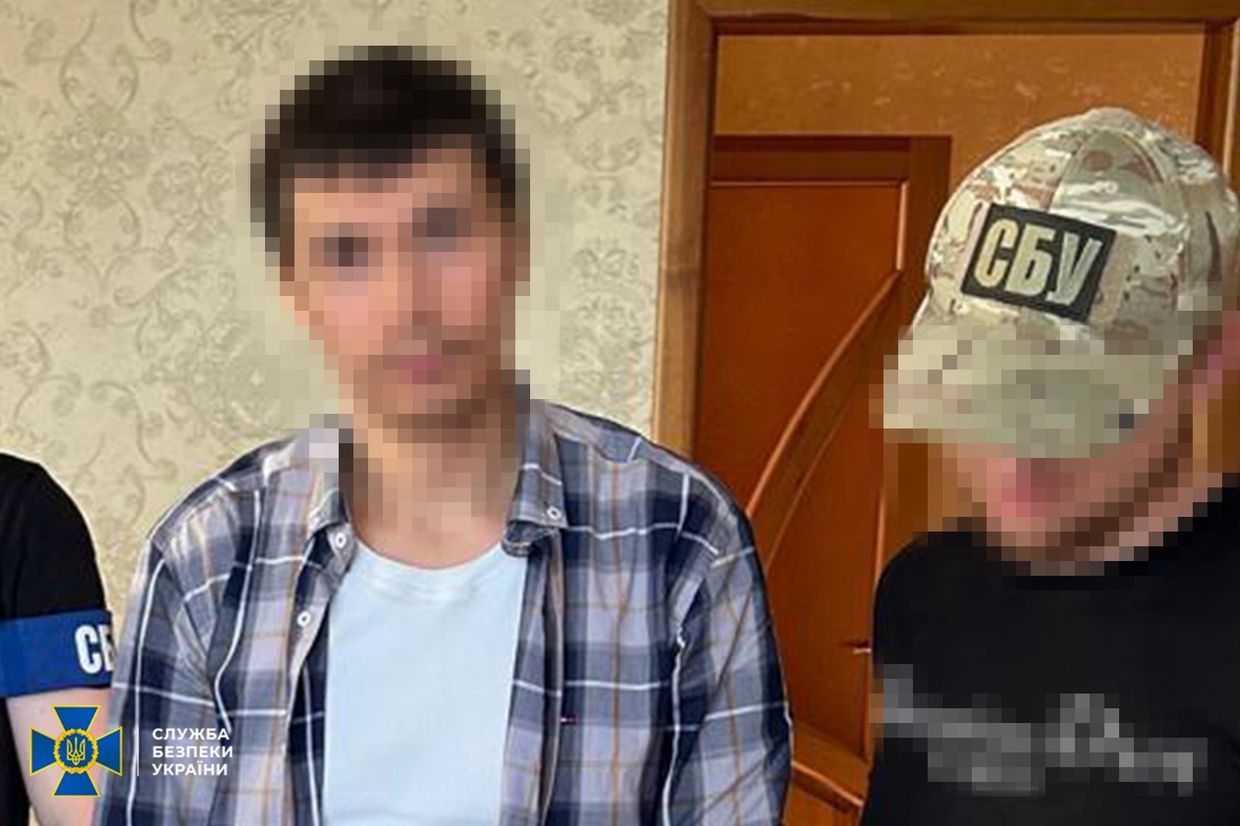
One of the suspects accused of helping direct Russian missile attacks on Kyiv in a picture released by the Security Service of Ukraine (SBU) (Security Service of Ukraine).
The perpetrators had been acting separately while being supervised by the same handler, a Russian military intelligence operative who had previously been identified.
One of the three assets is a Russian national, described as a “sleeper spy,” who was activated after the full-scale invasion. To help target Russian strikes, he allegedly set up an observation post on the roof of a Kyiv high-rise, exploiting his friendship with a representative of an apartment block management who had keys to the premises.
The other two charged perpetrators are current and former employees of Ukrainian defense companies. One is accused of gathering sensitive data about the consequences of missile hits and the number of personnel at factories and repair bases, while the other is said to have received information on potential targets from his colleagues, keeping them oblivious about his intentions.
During the raids, SBU officials seized computer equipment and mobile phones with intelligence reports, as well as a quad-copter that one of the alleged agents is said to have planned to use to spy on defense facilities.
The SBU has charged the Russian assets with high treason, along with aiding and abetting the enemy. At least two of the suspects are to be held in custody without bail.
The Weimar+ Initiative: European Powers Pledge Increased Aid and Additional Sanctions
The Weimar+ group announced on March 31 that it would increase aid to Ukraine while considering additional sanctions on Russia to pressure Moscow into a ceasefire, Reuters reported.
Foreign ministers from Spain, Germany, France, Italy, Britain, and Poland, along with EU foreign policy chief Kaja Kallas, called on Russia to agree to an “immediate and unconditional ceasefire on equal terms and with full implementation.”
The Weimar+ countries pledged to ramp up military, political, and humanitarian aid for Ukraine and warned that they are prepared to impose further sanctions on Moscow to ensure Kyiv secures the “best possible position to achieve a just and lasting peace.”
Any future peace agreement must include reliable security guarantees for Ukraine, the group said, emphasizing that they are “ready to play a leading role in this regard.” They also rejected any settlement that would limit Ukraine’s defense industry or restrict the presence of partner countries’ military forces on Ukrainian soil.
The meeting took place on the third anniversary of Ukraine’s recapture of Bucha, where Russian forces left behind mass graves and bodies of executed civilians in the streets.
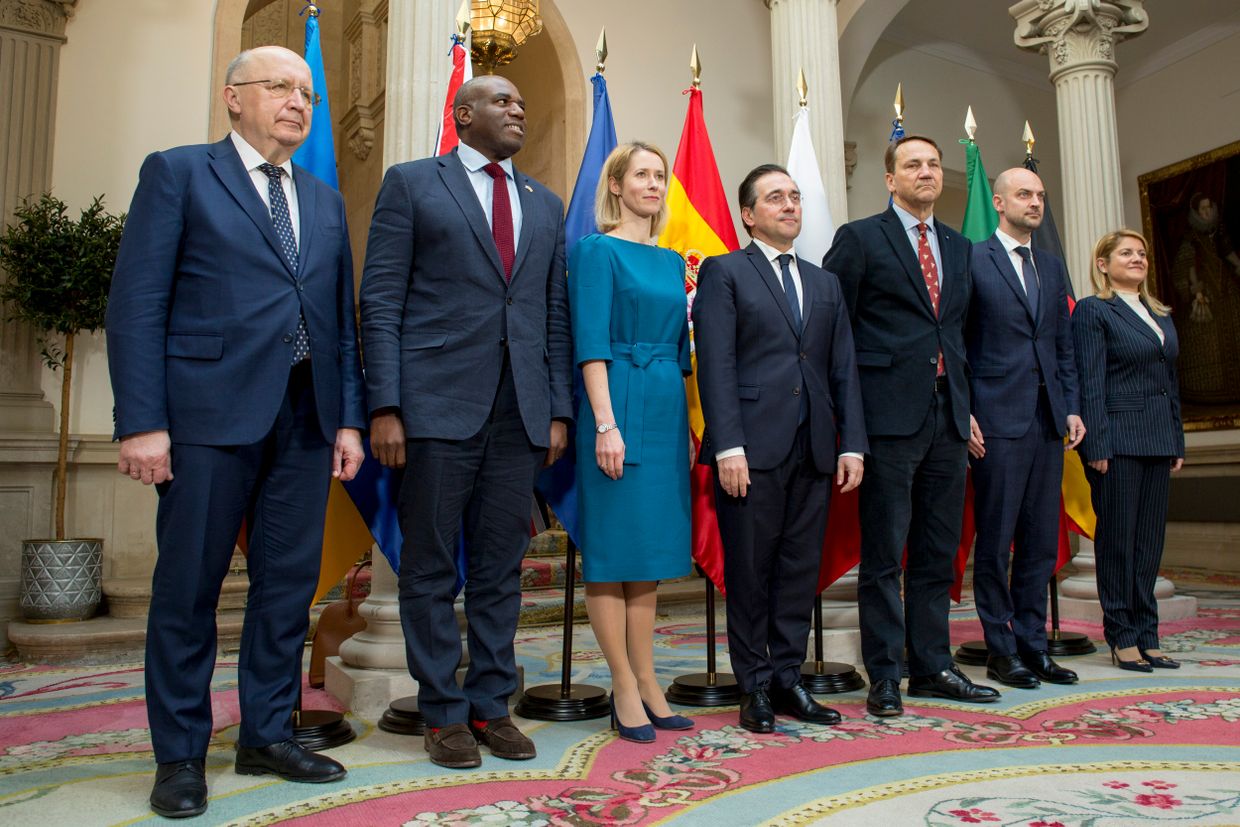
A meeting of foreign ministers of the G5+ forum is held to discuss European security and Ukraine at the Viana Palace. (Luis Soto / LightRocket via Getty Images)
The Weimar+ group reaffirmed its commitment to holding Russia accountable for war crimes and supporting efforts to establish a special tribunal within the Council of Europe. The statement also stressed that Russian assets frozen by Western countries should remain inaccessible until Moscow ends the war and pays reparations for the destruction it has caused.
IMF Support Continues: Ukraine Receives $400 Million Tranche
Ukraine has received the latest installment of the International Monetary Fund’s (IMF) budget support amounting to $400 million, Prime Minister Denys Shmyhal said on March 31.
The funds represent the latest tranche of the Extended Fund Facility (EFF) program, which will provide Kyiv with $15.6 billion in budget support over four years. With the additional $400 million in funding, the program has now distributed $10.1 billion in financing to Ukraine.
The IMF’s executive board approved the $400 million tranche on March 29 after completing its seventh review of the EFF agreement.
“We are grateful to the Fund… for its assistance and close cooperation in supporting the Ukrainian economy during the war,” Shmyhal said on social media.
“Russia’s war in Ukraine continues to take a devastating social and economic toll on Ukraine,” IMF Managing Director Kristalina Georgieva said in a press statement. “(Ukraine’s) economy has remained resilient, but the recent growth slowdown is expected to persist in 2025 due to headwinds from energy needs and a tight labor market. Contingency planning is key to enable appropriate policy action should risks materialize.”
Bucha Remembered: Zelensky Urges European Unity on Liberated Towns’ Anniversary
Ukrainian President Volodymyr Zelensky on Monday visited Bucha, where Russia’s army is accused of murdering hundreds of civilians three years ago, urging European allies to unite to prevent fresh massacres.
“Please remember that Bucha is not ‘somewhere in Ukraine’; it is something that can happen in any European country if our unity does not work now to genuinely hold Russia accountable for this war,” Zelensky said at a ceremony.
He and his wife Olena placed candles at memorial sites at a ceremony attended by parliamentary speakers from European countries, including the speaker of the House of Commons, Lindsay Hoyle. Officials held a minute’s silence in memory of civilians killed by Russia’s forces.
Ukrainian authorities have opened more than 180,000 war crimes investigations, Zelensky said, pinning hopes on the International Criminal Court to bring the most high-level criminals to justice.
As the U.S. administration tries to broker a ceasefire and eventual peace deal between Russia and Ukraine, Zelensky said his country wanted to end the war with “guaranteed security, which is very important, with lasting peace and with dignity.”
He also cautioned against lifting the sanctions imposed on Russia over its invasion, saying Moscow should not “benefit” from the war. “Pressure on Russia and sanctions against it are necessary to ensure that the war and abuse do not expand further,” he said.
The Digital Front: Moscow Metro Website Hacked Following Ukrainian Railways Attack
The Moscow subway’s website became unavailable on March 31, displaying only a banner with a message on the technical failure from recently hacked Ukrainian Railways (Ukrzaliznytsia).
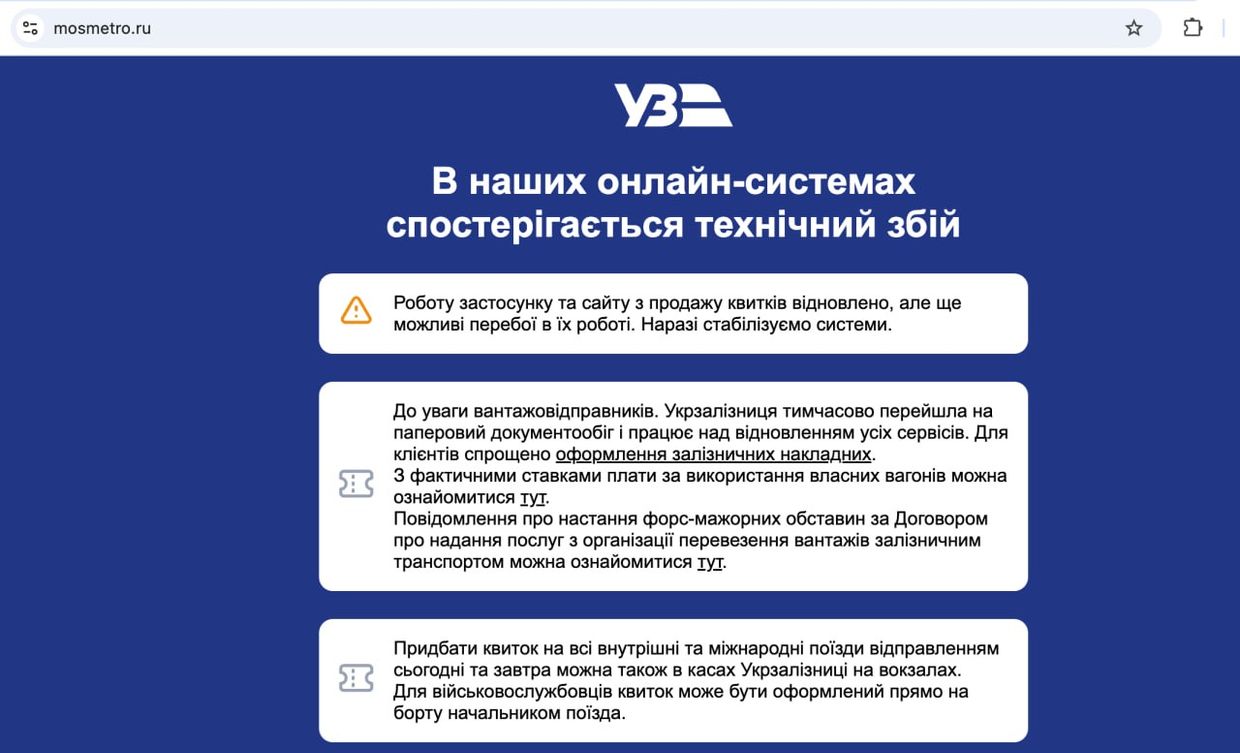
A banner with a message on the technical failure from the recently hacked Ukrainian Railways (Ukrzaliznytsia) was displayed on the Moscow Metro website. (Screenshot)
Russian users on the crash detection service Downdetector.su reported malfunctions with both the Moscow Metro app and the mosmetro.ru website. Earlier on March 31, the Moscow Metro website displayed the same banner as the one on Ukrainian Railways’ website during its technical failure.
The Moscow transport department wrote on its Telegram channel that due to technical maintenance, users may encounter temporary problems accessing personal accounts in the Moscow Metro application. According to Downdetector.su, up to 40,000 users noticed malfunctions in the Moscow Metro service over the past day.
The incident appears connected to a large-scale cyberattack that hit Ukrainian Railways’ computer networks on March 23, causing the website and app to fail and making it impossible to purchase tickets online. On March 27, Ukrainian Railways announced a partial restoration of online ticketing services after “89 hours of non-stop work.”
Looking Ahead: The Complexities of Peace
As March comes to a close, the path to peace in Ukraine remains fraught with obstacles and uncertainties. Trump’s “psychological deadline” for Putin leaves both sides guessing about what comes next, while Russia continues to demand sanctions relief in exchange for even limited ceasefires.
The reluctance of Russia to agree to a full 30-day truce, despite Ukraine’s willingness to implement one, reveals the fundamental disconnect between Moscow’s and Kyiv’s visions for ending the conflict. Meanwhile, European allies are stepping up with significant aid packages, concerned about the reliability of U.S. support under the Trump administration.
The underground tactics employed by Russian forces in Toretsk signal potential new developments on the battlefield, while Ukraine’s plans to deploy 15,000 robotic systems in 2025 suggest a technological arms race is underway.
As diplomatic efforts continue, the third anniversary of the Bucha massacre serves as a sobering reminder of what’s at stake for Ukraine and the international community. Zelensky’s warning that Bucha “could happen in any European country” if unity falters underscores the broader implications of this conflict for European security.
With Trump’s spiritual adviser witnessing the aftermath of Russian atrocities firsthand and Baltic states warning about the dangers of a hasty peace, the complex interplay of military realities, diplomatic negotiations, and moral imperatives will continue to shape the trajectory of the war in the months ahead.
